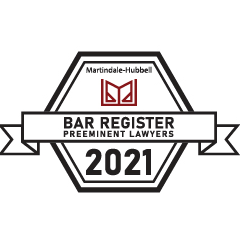Selecting an attorney is a personal matter, much like selecting a family physician or other professional. You may wish to ask a friend, relative or employer to recommend someone they know and trust.

When Should I Consult With an Attorney?
In many instances, the best time to see an attorney is before a problem occurs. Preventative law is one of the most valuable services an attorney can perform for you. Like preventative medicine, it can eliminate potential problems and help you save money in the long term.
Some situations in which you should consult an attorney are:
- Before buying or selling real estate;
- When you have been injured, as the result of another person’s negligence or because of a defective or unsafe product;
- Before making a Will or planning the distribution of your property on death;
- Before organizing a business;
- If you are involved in an incident in which there is injury to persons or damage to property;
- When there are changes in your family status – – marriage, adoption, divorce; or
- A lawsuit is brought against you or you want to bring a lawsuit against someone.
What Should I Expect When I Hire an Attorney?
You are hiring an attorney to work for you as your advocate. You should expect your attorney to:
- Confer with you to analyze the problem;
- Research and analyze all available facts and information relative to your problem;
- Interview those involved;
- Prepare legal arguments for presentation in court, if litigation is involved;
- Negotiate a settlement if both sides can reach a fair agreement;
- Keep you informed about progress in your case and answer your questions;
- Discuss fees with you at your first visit and agree how the fee will be paid;
- Be candid with you about your problem, your prospects for success, the time it will take and advisability of accepting any settlement offered; and
- Keep in confidence anything you say.
What Will My Attorney Expect of Me?
Your attorney will expect you to:
- Be completely honest about all facts concerning your case, whether or not they are favorable to you;
- Be on time for appointments and not take up excessive time with visits or phone calls relating to minor details;
- Carefully consider his or her advice;
- Be patient and understand that legal matters are rarely “open and shut” cases; they require time and research and no attorney can guarantee results in a contested matter; and
- Pay a reasonable fee for the work performed.
How Do Attorneys Charge for Their Services?
An attorney may charge by the hour for his or her services. Further, an attorney will typically request a retainer prior to accepting your legal matter. A retainer is based upon the amount of time the attorney estimates that the matter may take. A retainer paid to an attorney will be deposited in a trust account and the retainer belongs to the client until it is earned by the attorney.
In some instances, an attorney may take your case on a “contingency fee” basis. If your case is successful, the attorney receives a percentage of the judgment or settlement, plus out-of-pocket expenses. If the case is not successful, you pay only the expenses.
Your attorney may not always be able to tell you exactly what the fee will be, but he or she can usually estimate what the minimum or maximum limits would be for a particular type of work or give you an idea of the problems involved and the time that will be required. The subject of fees should be discussed openly and frankly with your attorney, preferably on your first visit.
Can I Handle My Own Legal Matters?
You can represent yourself in court and you can handle your own legal matters if you wish. There are kits sold by different organizations which are supposed to help you handle your own legal matters. Most attorneys advise against using these products and services because they are not designed to take into consideration individual circumstances and complications which may arise with any legal matter. They also do not necessarily take into account Nebraska law or the changes in Nebraska law, which have occurred in recent years. So, in the end, you still may spend time and money on these things and you still may not be able to accomplish what you wish.
Attorneys are trained to provide professional legal assistance, to know the law, court procedures, filing requirements, deadlines and other details which a non-attorney might not know and which could make the difference between winning and losing a given case, or obtaining the desired results in a legal matter.
Have you made a Will yet?
Visit our Wills page to read answers to the following questions:
- What is a will?
- What are the requirements for a will?
- Who needs a will?
- Who should draft my will?
- Can a will be changed?
- Is joint tenancy a substitute for a will?
- What happens if you die without a will?
- Can I appoint a guardian for my children in my will?
- What is a personal representative?
- Does the personal representative have to live in Nebraska?
- What are the personal representative’s duties and obligations?
- Can more than one person be named as personal representative?
- Can I dispose of my property in any way I wish?
- Should I leave a separate list disposing of personal property?
- How can a person contest a will?
- How can a will save money?
- Must the will be read to the family?
- Why must an estate go through court?
- When should I make a will?

